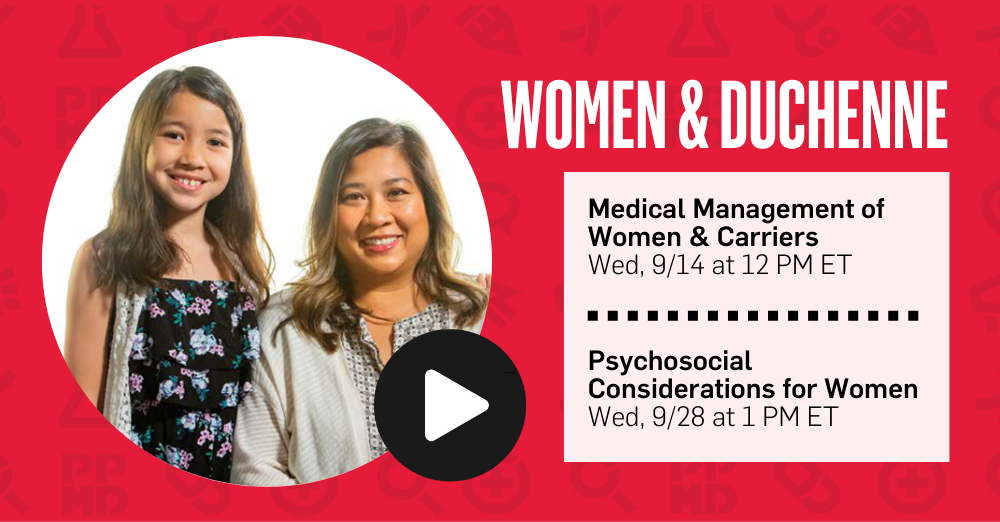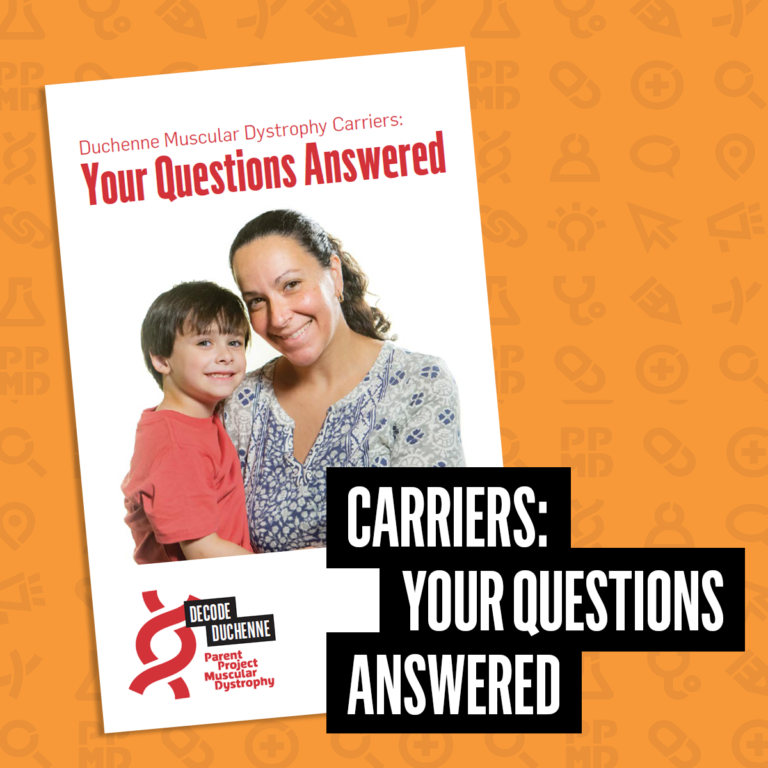
WATCH: Medical Management of Women & Carriers (Webinar Recording)
As part of World Duchenne Awareness Day’s emphasis on Women in Duchenne, PPMD recently hosted a webinar titled, The Medical Management of Women Carriers of Duchenne.
PPMD’s Rachel Schrader, VP of Clinical Care and Education, moderated the discussion with three experts: Dr. Stanley Nelson (UCLA), Dr. Alison Barnard (University of Florida) and Dr. Russell Butterfield (University of Utah).
Watch: Medical Management of Women & Carriers
Carrier Genetics
Dr. Nelson, a geneticist at UCLA, provided a thorough overview of the genetics of Duchenne carriers and why some women may show symptoms, otherwise known as manifesting carriers. Dr Nelson explained:
- The difference between obligate carriers —those with a family history of Duchenne—and carriers with de novo variants—where the genetic change is seen for the first time.
- A very small number of women only have one X-chromosome (instead of typically having two), allowing a DMD mutation to cause a classic Duchenne phenotype, or symptoms.
- Non-random X-inactivation is where the X-chromosome that does not have the DMD variant is turned “off” in many of the cells. This allows the affected X-chromosome to cause Duchenne symptoms in women. Testing for this can be difficult, however, because not all cells may be affected the same throughout the body.
- About 70% of carriers have increased CK and Liver Enzyme tests (AST/ALT). Although, this does not always mean worse physical symptoms.
- Physical symptoms of Duchenne/Becker carriers may include muscle weakness, fatigue, and cardiomyopathy.
Because having a DMD variant as a woman can result in physical symptoms, it’s recommended that all girls and women who are possible carriers due to family history should receive genetic counseling and testing to confirm their carrier status. In some cases, a muscle biopsy may be helpful to determine if a carrier is manifesting symptoms of Duchenne, or experiencing other causes of her symptoms.
Key Take-Aways from Dr. Nelson:
- All potential carriers should be genetically tested for their known family variant.
- CK can be helpful in screening for potential or known carriers, but is not always elevated in carriers.
- Blood testing for X-inactivation does not strongly predict x-inactivation skewing in the muscle.
- Muscle biopsy can directly observe dystrophin expression in the muscle; discuss whether biopsy would be useful for your plan of care with your doctor.
Carrier Research Study
Dr. Barnard, a research assistant professor at University of Florida and part of the ImagingDMD team, recently conducted a small pilot study of women carriers of Duchenne and shared her findings with the group. Dr. Barnard’s study included 6 children and 11 adults (all female carriers), and looked at medical history, CK level, fatigue, muscle pain, functional tests, and whole-body MRI. Dr. Barnard’s pilot study showed the following results:
- Among carriers, CK levels were much higher in pediatric participants than adults.
- All adult carriers in the study reported muscle fatigue, while reports from non-carrier control participants were much lower.
- Muscle pain was present in both children and adult carriers, but more prevalent in adults.
- MRI results showed a broad spectrum of fatty replacement and muscle degeneration, and did not correlate directly with reported physical symptoms of pain, fatigue, or weakness from participants.
- Some participants had significant asymmetry in muscle degeneration, which is very different from changes seen in people with Duchenne, which are typically symmetric (same from side to side).
Muscle inflammation was also assessed during this study, as inflammation is almost always present in the muscle of boys and men with Duchenne. There was significant variability of inflammation across carrier participants; while some carriers had no inflammation, some had mild/subtle inflammation, and others had significant inflammation in multiple muscle groups. Overall, inflammation is highly variable in this small group of pilot participants and no clear pattern or predictability was observed. More work needs to be done to better understand the presence of inflammation in carriers.
Key Take-Aways from Dr. Barnard:
- Fatigue and muscle pain are under-recognized, but frequently reported by carriers.
- Functional testing used for Duchenne are often not sensitive enough to detect changes or asymmetry in manifesting carriers.
- Treatment recommendations should be individualized to each carrier and her specific signs and symptoms.
Clinical Care for Carriers
Dr. Butterfield, a neurologist at University of Utah, applied the above findings to the clinical management of girls and women who manifest symptoms of Duchenne/Becker, or dystrophinopathy. Dr. Butterfield discussed:
- How we define symptomatic manifesting carriers- someone who has either muscle weakness and/or presence of dilated cardiomyopathy, versus asymptomatic manifesting carriers—someone without significant physical symptoms but has an elevated CK and/or minor muscle cramps or myalgias.
- Standards of care for carriers and women with Duchenne have been difficult to establish due to lack of concrete data to guide standardization.
- Current consensus among clinicians revolves around cardiac evaluation and treatment, after a recent study showed 49% of carriers had fibrosis on MRI. Cardiac monitoring including ECG and echo or MRI is recommended every 3-5 years for carriers.
- An early study showed that out of a cohort of 129 carriers, 5% had myalgias (muscle pain), 22% had symptoms including weakness, and 7% had dilated cardiomyopathy while 18% had a dilated left ventricle.
Clinical care for girls and women who manifest symptoms are based upon clinical judgment, which may include use of corticosteroids, exon skipping therapies, and consideration for future approved therapies or participation in clinical trials. Whether these therapies are appropriate may be based on severity of symptoms, mechanism of action and target of the drug, and overall access to the drug, whether commercially or via clinical trial eligibility criteria.
Key Take-Aways from Dr. Butterfield:
- Once a genetic variant is identified in a person with Duchenne, their mother (and subsequently, other female relatives including sisters, aunts, etc.) should be offered genetic counseling and testing.
- CK levels can impact some liver function test results (ALT/AST). If there is concern for liver dysfunction, a GGT test may be helpful in determining true liver function.
- Carriers and women with Duchenne should talk with their medical provider to understand what the most appropriate plan of care looks like for each individual when it comes to potential treatment options and managing symptoms.
- It is generally okay to do physical exercise for carriers; if you are concerned, you should discuss this with your doctor.
- Be sure to take care of yourself! Whether through massage, counseling, or other self-care activities, caring for yourself as a carrier is critical, especially when layered over caregiving for a loved one with Duchenne.
PPMD Resources & Support
Do you still have questions or need support? Reach out the team at PPMD—we’re here and happy to help!
- If you have questions about genetics, carrier testing, or clinical trials, take advantage of our genetic counselors’ office hours and schedule an appointment here, or send an email to coordinator@parentprojectmd.org. Additionally, if accessing testing is difficult, PPMD can help via the Decode Duchenne program, which offers free genetic testing for at-risk girls and women.
- To speak with PPMD’s care team of nurses and nurse practitioners, schedule an appointment here, or send an email to careteam@parentprojectmd.org.
- PPMD created Duchenne Muscular Dystrophy Carriers: Your Questions Answered, a resource for women who are carriers. The brochure is a comprehensive guide to the questions most often asked by carriers and is available in both English and Spanish. It was developed in collaboration with carriers and with expert providers from neurology, genetics, cardiology, and psychology.
Join Our Upcoming Webinar: Psychosocial Considerations for Women in Duchenne — Sept. 28
While we often think of the physical aspects of Duchenne, we don’t often talk about the emotional effect it has—especially for caregivers. Join PPMD on Wednesday, September 28th at 1 PM ET for a discussion on the psychosocial implications for all women in Duchenne, including carriers and non-carriers, moms, sisters, grandmothers, other family members and more.
Register Now >



 by: Parent Project Muscular Dystrophy
by: Parent Project Muscular Dystrophy


